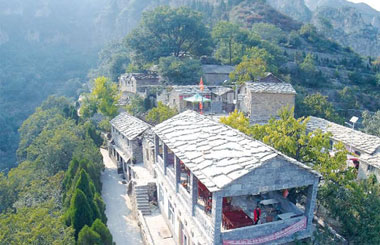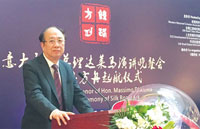Full Text: Freedom of Religious Belief in Xinjiang
Updated: 2016-06-02 16:46
(Xinhua)
|
|||||||||
VII. Active Role of Religious Circles
Since the founding of the People's Republic of China in 1949 the policy of freedom of religious belief has been comprehensively implemented in Xinjiang, arousing the enthusiasm of religious circles in participating in economic and social construction. Since the initiation of the reform and opening-up era in 1978, and especially in recent years, progress has been made in all social undertakings in Xinjiang, and the autonomous region's comprehensive strength, rule of law and people's well-being. Great changes have taken place on both sides of the Tianshan Mountains. Religious circles have played an active role in maintaining Xinjiang's social stability and lasting peace, and promoting the comprehensive development of Xinjiang's economy and society.
Uphold national unity and ethnic solidarity. In China, the core of maintaining national unity and ethnic solidarity lies in anti-secessionist work. For a long time, Xinjiang religious circles have been enhancing the concept of the rule of law, abiding by laws and regulations, and fostering the national consciousness, civic awareness and sense of community of the Chinese nation. They have taken the lead in setting an example in the maintenance of national unity, in stopping words and deeds undermining national unity, and in publicizing local role models of national unity. They have striven to become fine examples of national unity, and have led religious believers in contributing to the Chinese Dream of rejuvenation of the Chinese nation.
Oppose religious extremism and safeguard social stability. Xinjiang religious circles, taking root in the local soil and culture, have furthered scripture study with Chinese characteristics, inherited and carried forward the fine traditions of patriotism, peace, unity, moderation, tolerance and benevolence, opposed violence and advocated the rule of law and order. When facing fallacies propagated by religious extremist forces, they have exposed their lies with proper faith. When violent or terrorist events take place, they always express their opinions and uncover the truth. After the July 5, 2009 riot in Urumqi, the May 22 bombing in Urumqi and the attacks on July 28 in Shache in 2014, Xinjiang religious circles immediately stated their stand, and condemned the violent criminal and terrorist offenses. When religious extremist forces take advantage of religion to interfere with people's life, they criticize such acts according to their doctrines and actively guide religious believers to maintain proper faith and conduct honest deeds.
Participate in economic construction. Carrying forward the fine tradition of reaching out and benefiting all beings, Xinjiang religious circles guide religious believers to master advanced technologies, participate in economic construction and improve living conditions. They encourage religious believers to become better off through diligent work, for instance, contract of land, setting up businesses, planting, animal breeding, transportation and food processing. They hold demonstrations to introduce experiences of achieving prosperity through hard work and hold up model households as examples. They also try to foster in religious circles a good atmosphere of honoring labor, prosperity through hard work, and advocating science and technology.
Be enthusiastic about social service and public welfare. Xinjiang religious circles actively conduct public welfare and charity activities. They hold annual charity week jointly launched by five major religions to promote public welfare and charity undertakings in Xinjiang. They have participated in disaster relief, with both donation and prayers, for the earthquake victims in Wenchuan, Yushu and Pishan, and said prayers for and donated money and materials to victims of the May 22 terrorist bombing in Urumqi and other violent and terrorist events. Besides, they also play a positive role in charitable donations, support for the elderly and schoolchildren, poverty alleviation, spiritual consolation, environmental protection and construction of public facilities.
Conclusion
History has proved that the existence and development of religions must be adapted to society and follow the path of localization; the coexistence and integration of religions must be achieved through inclusiveness, mutual learning and harmony; and the freedom of religious belief can only be obtained by keeping religious wars and conflicts at bay.
Facts show that since the founding of the People's Republic of China, the Constitutional principle of freedom of religious belief has been comprehensively implemented in Xinjiang, the citizens' freedom of religious belief is fully respected, believers' normal religious needs are effectively met, the positive role of religious circles in promoting economic development and social stability is well displayed, the government's capability of administrating religious affairs is constantly strengthened, international exchanges in the religious field are being expanded, and the proliferation and spread of religious extremism is being effectively contained.
China, based on its national conditions, sticks to the principle of independence and self-management of religious undertakings, and will never allow any foreign organization or individual to interfere with China's religious affairs. China is a socialist country in which the religions of Xinjiang exist and are active. That religions must be adapted to the socialist society is not only the requirement of China's national conditions but the intrinsic requirement of religions for their own existence and development.
Today, the freedom of religious belief in Xinjiang cannot be matched by that in any other historical period, and is undeniable to anyone who respects the facts. The Chinese government resolutely opposes the politicization of religious matters and any other country's interference in China's internal affairs in the name of religion.
China is now at a decisive stage of comprehensively building a moderately prosperous society in all respects. As the core region of the Silk Road Economic Belt, Xinjiang will continue its international cooperation and exchanges on the basis of equality, friendship and mutual respect, promote dialogue and exchanges among different religions and civilizations, enhance mutual trust and understanding, and make remarkable contributions to world peace and development as well as to human civilization and progress as a whole.
Related Stories
Xinjiang has 24,800 venues for various religions: white paper 2016-06-02 13:10
Xinjiang enjoys unprecedented religious freedom: white paper 2016-06-02 10:59
China issues white paper on freedom of religious belief in Xinjiang 2016-06-02 10:59
Karamay holds Sixth Western Xinjiang Integrative Development Symposium 2016-06-01 17:13
Today's Top News
China looking forward to trade talks with EEU: MOC
Russia to promote EAEU-China economic cooperation
AIIB 'set to earn international trust, credibility'
EIB and AIIB to strengthen cooperation
Some 13,000 migrants saved, over 700 dead
Economists urge go-slow on EU's anti-dumping
Chinese investors eye European soccer goal
Rescue vessel eyed for the Nansha Islands
Hot Topics
Lunar probe , China growth forecasts, Emission rules get tougher, China seen through 'colored lens', International board,
Editor's Picks

|

|

|

|

|

|







